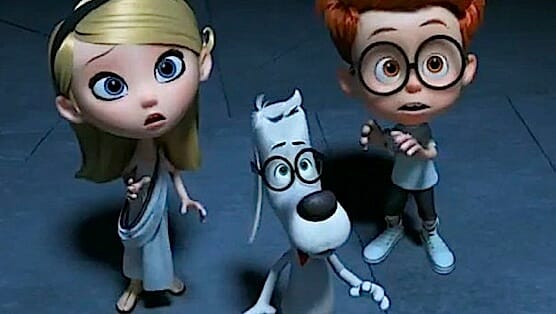Mr. Peabody & Sherman

Capturing the zeitgeist sometimes comes down to a fluke of timing, and Mr. Peabody & Sherman—the reasonably clever, reasonably charming new comedy from DreamWorks Animation—has the bad fortune to open in the wake of a massively clever, massively charming animated competitor, The LEGO Movie. That shouldn’t matter much to family audiences hungry for as much decent product as possible, but with LEGO so fresh in the collective consciousness of broader audiences, Peabody can’t help but play like small potatoes.
At the very least, Mr. Peabody & Sherman is a reminder that Hollywood’s obsession with reboots/revivals/re-imaginings can be done right. The characters originated on the beloved ’60s cartoon series The Rocky and Bullwinkle Show, and the track record for bringing segments from that show to the big screen is pretty dreadful. Both 2000’s The Adventures of Rocky and Bullwinkle (with Robert De Niro and Rene Russo) and 1999’s Dudley Do-Right (Brendan Fraser and Sarah Jessica Parker) were major flops with critics and audiences. 1997’s George of the Jungle (also starring Fraser and inspired by a separate series from Rocky and Bullwinkle creator Jay Ward) was a hit, but not the kind that’s remembered fondly.
Peabody director Rob Minkoff (The Lion King, Stuart Little) makes the wise choice of keeping the new film strictly animated, no live action needed. That decision both respects the original material and frees up the possibilities for a story that begins with a wacky premise—a dog, Mr. Peabody, who happens to be a certified genius adopts a human boy, Sherman, as his son—and gets crazier from there as the duo travel through time in Mr. Peabody’s WABAC machine (that’s pronounced “way-back”). He’s a sort of doggie Doctor Who, although his travels are confined to Earth.
The original Peabody shorts are known for their smart, pun-driven humor and amusing riffs on history and culture, all of which is retained here. But to flesh out the story to feature-length, screenwriter Craig Wright (whose eclectic and considerably more mature TV writing credits include the abortion episode of Six Feet Under and the season two “Orientation” episode of Lost) adds a sentimental parent-child arc that’s overly familiar from numerous other animated features.
-

-

-

-

-

-

-

-

-

-

-

-

-

-

-

-

-

-

-

-

-

-

-

-

-

-

-

-

-

-

-

-

-

-

-

-

-

-

-

-








































